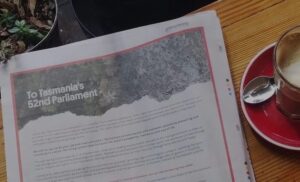This week’s budget was full of good news about good economic times. The combination of favourable economic conditions and some good economic management could have been a once in a generation opportunity to build for the state’s future. Built on the back of our clean and green image, a boom in revenues has been fuelled by growth in tourism and the property market. But booms are temporary, (that’s why they are called ‘booms’) and smart governments use boom times to invest in vital long-term prosperity building projects.
[This article was first published in the Hobart Mercury – here]
Combining excess public funds with private investment in pursuit of community wide benefit is an inherently good idea. Smart governments use public money to leverage future returns from an existing competitive advantage. A good rate of return on the public investment, is delivered by creating jobs, stimulating economic activity around core projects, providing access to infrastructure and ensuring a multiplier effect into the future.
However, this budget appears to miss the opportunities available to build for the future rather than seize them. There is a lot of talk about growing the economy but the list of missed opportunities is longer than the one for opportunities taken.
Promoting Tasmania as a centre of excellence in science, technology, engineering and maths. Already overlooked in the federal budget, the University of Tasmania’s, Launceston STEM project has missed out again the State budget
Promoting industries where we have a natural advantage
Renewable energy
No money for increasing solar or wind energy generation that could transform Tasmania into a renewable energy centre of excellence. Tasmania has a natural advantage in renewable energy. In a carbon constrained world, we are already ahead of the pack with Hydro providing the country’s biggest battery, and a skilled workforce with deep knowledge in renewables. Increasing renewables capacity and turning the island into a 100% renewable energy island would provide a powerful incentive to companies to relocate to the state. The government has taken action to cap electricity prices, but this short term measure of capping prices is no substitute for increasing generation that would create long term and ongoing downward pressure on prices.
ICT Industry
No money was in the budget to connect into an intercontinental data pipe that could transform our ICT sector. The two cables cable, totalling almost 10,000 kilometres, will start in Singapore before heading south to Jakarta, Perth and through the Bass Strait to Sydney. Tasmania is an ideal place for data centres with our temperate climate, relatively low land prices and stable economy. However, data centres and large scale ICT companies require increased security of connectivity before they will commit to our state, linking into the cable would provide that security. Despite being one of the first states to get the NBN, Tasmania remains the state with the lowest levels of digital literacy. The budget had no funding for closing the digital literacy divide between Tasmania and the mainland.
Tourism
Acknowledging the importance of tourism to Tasmania, the state budget committed $37 million funding to boost the industry. However, the largest places of need in tourism have been underfunded. In a time of booming numbers of visitors to Tasmania, is $11 million required to get more people here? Or should the emphasis have been on increasing skills to service tourists and more money into infrastructure for national parks – one of the main drivers for our increasing tourist numbers. National parks facility improvements only received $8 million over two years, whilst training received a woefully small $3 million. Shortages in appropriately skilled staff for the hospitality and tourism industry has been identified as one of the biggest difficulties on the horizon for the industry.
Leanne Minshull is the Director of The Australia Institute Tasmania @leanneminshull
Between the Lines Newsletter
The biggest stories and the best analysis from the team at the Australia Institute, delivered to your inbox every fortnight.
You might also like
Open Letter to the Tasmanian Government
The Australia Institute and 30 other organisations from around Tasmania have published an open letter with 10 asks for the environment from whomever forms Tasmania’s next government. When cross-benchers and major parties have struck successful power-sharing agreements elsewhere, they covered policy as well as procedure, making now the ideal time for progress.
One year on from the State of the Environment Report, what’s changed?
(Spoiler alert: nothing!)
Are Australians eating diseased salmon? Sickening new revelations from Tasmania
Shocking new revelations about Tasmanian salmon should leave all Australians feeling sick to the stomach.



